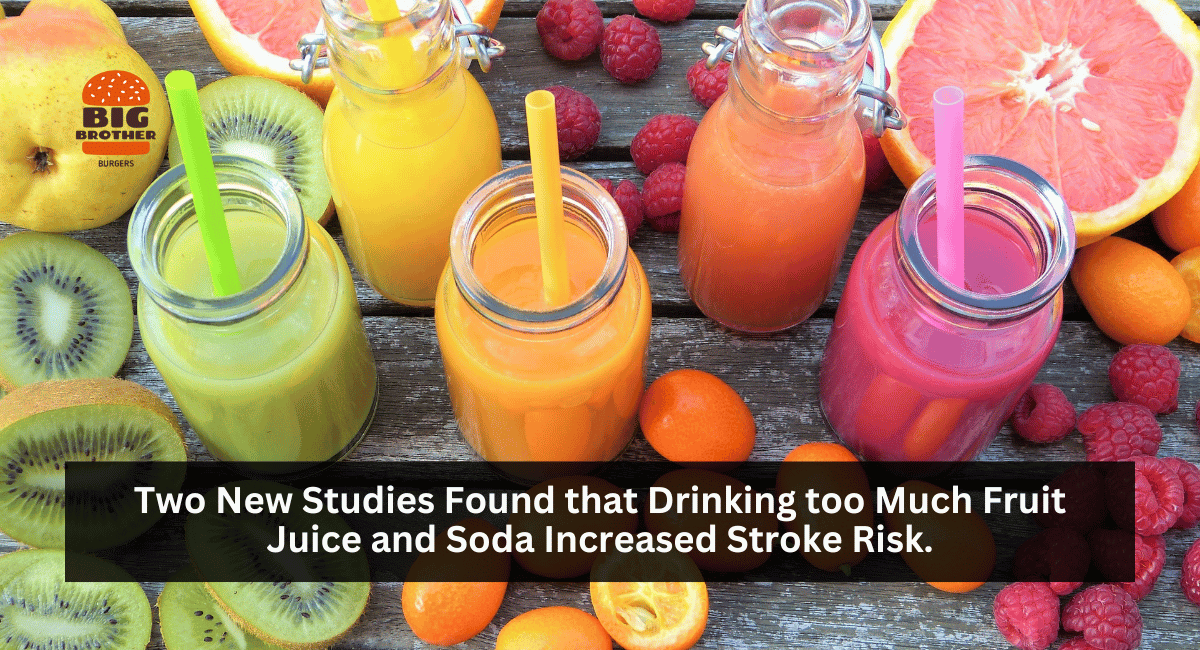Drinking water all the time can get a little dull, so many people reach for sodas, fruit juices, and other flavored beverages. However, two new studies suggest that consuming these drinks too often may increase your risk of stroke.
The research, published in the Journal of Stroke and the International Journal of Stroke, links overindulgence in sugary drinks to higher chances of stroke, particularly when consuming multiple servings daily.
What the Studies Found About Soda, Fruit Juice, and Stroke Risk
The first study, part of the Interstroke research project, involved nearly 27,000 people from 27 countries. It focused on the effects of both sugar-sweetened and artificially sweetened fizzy drinks, as well as fruit juices, on stroke risk. Here’s what they found:
- Fizzy Drinks: Consuming these beverages was associated with a 22% increase in stroke risk. The risk spiked even higher for people who drank two or more sodas daily.
- Fruit Juice: Surprisingly, fruit juice was linked with an even more significant increase in stroke risk at 37%. Drinking two or more servings per day tripled the risk.
- Water Consumption: On the other hand, drinking more than seven cups of water daily seemed to lower the risk of stroke caused by blood clots.
The second study also used Interstroke data, exploring the relationship between coffee, tea, and stroke. Results showed that:
- Coffee: Drinking more than four cups of coffee daily raised stroke risk by 37%. However, consuming less than this amount didn’t carry the same risk.
- Tea: Tea drinkers had a lower chance of stroke, with the risk reduced by up to 20%.
These findings raise important questions about how these popular beverages affect our health. Let’s examine what experts say about these results.
Understanding Stroke and Its Causes
A stroke occurs when blood flow to the brain is interrupted due to a blockage or sudden bleeding within the brain. According to the National Heart, Lung, and Blood Institute (NHLBI), there are two primary types of stroke:
- Ischemic Stroke: This is the most common type, where a blocked artery prevents oxygen and nutrients from reaching the brain. Brain cells can start to die within minutes.
- Hemorrhagic Stroke: This type occurs when a blood vessel in the brain bursts, causing bleeding in or around the brain.
Dr. Amit Sachdev, a neurologist at Michigan State University, explains that when a stroke happens, part of the brain suffers damage. While the brain can often find ways to work around the damaged area, recovery is not always guaranteed.
Stroke recovery can be lengthy and disruptive, usually impacting a person’s quality of life.
Why Might Soda and Fruit Juice Increase Stroke Risk?
While these studies show a connection between sugary drinks and stroke, they don’t fully explain why this link exists. Dr. Andrew Smyth, lead researcher of both studies, offers some theories:
- Sugary Ingredients: Full-sugar sodas contain high sugar levels, which can lead to weight gain and raise calorie intake. Artificially sweetened sodas may have other ingredients that affect heart health.
- Impact on Blood Sugar: High sugar levels in both sodas and fruit juices can spike blood sugar and insulin levels, causing inflammation, which can contribute to stroke risk.
Dr. Christopher Yi, a vascular surgeon, adds that sugar-laden beverages can lead to obesity, diabetes, and high blood pressure—all significant risk factors for both ischemic and hemorrhagic strokes.
How Coffee and Stroke Risk Are Connected
Drinking more than four cups of coffee daily was associated with a 37% increase in stroke risk. But why? Dr. Sachdev suggests several possible explanations:
- High Caffeine Intake: Consuming large amounts of caffeine can raise blood pressure, a key risk factor for stroke.
- Underlying Health Issues: Some people might drink a lot of coffee to cope with fatigue or other health issues, such as sleep disorders, which are also linked to stroke risk.
It’s important to note that moderate coffee consumption doesn’t carry the same risk. Other studies have shown that coffee can have health benefits when enjoyed in reasonable amounts.
How to Lower Your Stroke Risk
Consider cutting back if soda, fruit juice, and excessive coffee are regular parts of your diet. Here are some expert-recommended tips for reducing stroke risk:
- Limit Sugary Drinks: Choose water or unsweetened beverages like tea over sodas and fruit juices. Dr. Smyth recommends tea as a hot drink alternative and water as a refreshing cold option.
- Stay Active: Physical activity plays a significant role in maintaining heart health. Aim for at least 150 minutes of moderate-intensity weekly exercise to boost circulation and overall health.
- Adopt a Balanced Diet: A plant-based or plant-forward diet rich in fruits, vegetables, and whole grains can reduce inflammation and improve heart health.
- Monitor Your Health: Be aware of your family and personal medical history, particularly if you have risk factors for stroke, such as diabetes, high blood pressure, or a smoking history. Dr. Sachdev suggests talking to a healthcare provider about whether preventive measures, such as low-dose aspirin, could benefit you.
Conclusion
While soda, fruit juice, and coffee might be part of your daily routine, it’s crucial to be mindful of how much you consume. Both sugary and artificially sweetened drinks, as well as high coffee intake, have been linked to an increased risk of stroke in these recent studies.
Choosing water and unsweetened teas more often can help you stay hydrated without the added risks.
Making these changes may feel challenging initially, but even small steps toward a healthier lifestyle can significantly reduce stroke risk. Remember, caring for your body today can protect your brain for years.
READ MORE: Costco Has a Chick-fil-A Copycat Fans Call ‘Freaking Amazing’

